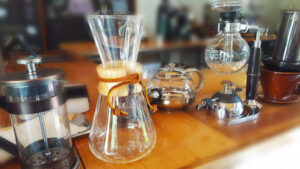It is important to take good care of your coffee machine so that it continues to work well and continues to make delicious, high-quality coffee. Regular maintenance not only extends the life of your coffee machine, it also ensures that your coffee always tastes fresh. This article discusses important maintenance tips that anyone who owns a coffee machine should follow.
1. Clean Regularly
Cleaning your coffee maker regularly is one of the most important things you can do to keep it in good condition. Minerals in water, coffee grounds, and coffee oil can build up in your coffee maker, changing the taste of your coffee and causing your machine to work less efficiently or not work at all. You should give your coffee machine a thorough cleaning at least once a month. Depending on how often you use it, you may need to clean it more often. This requires descaling the machine to remove the mineral layer, cleaning all removable parts, and wiping the exterior.
2. Using the Right Water
The type of water you use in your coffee maker can have a big impact on the taste of your coffee and the lifespan of your machine. Hard water contains high amounts of minerals that can cause limescale to build up more quickly, blocking water flow and damaging heating elements. Using bottled or filtered water prevents limescale deposits and extends the life of your machine. Moreover, it makes your coffee taste better.
3. Clean the Coffee Machine
Descaling is an important part of maintenance that you should not skip. Limescale is a mineral layer in the water that can build up in your coffee maker over time, mainly along the water pipes and heating element. These deposits can cause your coffee machine to work less well and your coffee to taste worse. Most manufacturers say you should descale your machine every three to six months, but this can change based on the hardness of your water and frequency of use. To remove this deposit you can use vinegar or a descaling product.
4. Purchase New Parts if Necessary
Over time, certain parts of your coffee maker wear out and need to be replaced to keep it working optimally. In this case, the water filter should be replaced according to the manufacturer’s instructions, usually every two months or after approximately 60 refuelings. In addition, seals and gaskets should be regularly checked for wear and replaced if necessary to prevent leaks and maintain pressure during coffee brewing. This is especially important for espresso machines.
5. Be Careful
The best way to ensure that your coffee machine lasts longer is to use and care for it properly. Always follow the machine manufacturer’s instructions. Do not use aggressive cleaning agents or tools that could damage or scratch machine parts. Also, make sure the machine is fully assembled before using it to avoid any problems or damage.
6. Break the Right Approach
When the coffee machine is not in use, store it in a dry, cool place. To prevent mold growth, make sure the appliance is unplugged and all parts are dry. If you plan not to use the machine for a long time, you should drain the water in the tank so that the water does not remain there and bacteria can grow.
7. Look for Changes and Recalls
It is important to keep the software up to date on more modern or automated coffee machines. Manufacturers sometimes release firmware changes to fix bugs or make software work better. Also, be aware of any recalls or safety warnings that apply to your model. This keeps your machine safe to use and prevents accidents.
8. View the Manual
Finally, I can’t say enough good things about the owner’s manual. It includes maintenance tips specific to your coffee machine model, warranty coverage information, and ways to troubleshoot typical problems. Check regularly whether you are maintaining your coffee maker according to the instructions.
Conclusion
In short, maintaining your coffee machine means cleaning it regularly, using the right water, descaling regularly, replacing worn parts, operating it carefully, storing it properly, keeping the software up to date, and reading the manual for specific maintenance instructions. These tips will not only ensure that your coffee maker continues to work well and make delicious coffee, but also help to extend its lifespan.
FAQs
1. How often should I clean my coffee machine?
You should give your coffee machine a thorough cleaning at least once a month. But if you use your coffee maker every day, you may need to clean it more often to prevent coffee oils and mineral deposits from building up.
2. Why do you need to descale your pipes and how often should you do it?
Descaling is the process of removing the mineral layer (especially calcium carbonate) that forms on the boiler and other parts of your coffee machine. How often you need to descale your coffee machine depends on the water hardness and frequency of use, but in general, you should descale your coffee machine every three to six months.
3. Can I use vinegar to clean my coffee maker?
Yes, vinegar works well at removing limescale from your coffee maker. Run the machine with a mixture of equal parts white vinegar and water. Then run a few rounds of white water to remove any vinegar smell that may still be present.
4. What kind of water should I put in my coffee maker?
Filtered or bottled water helps prevent limescale deposits and makes your coffee taste better. Distilled water doesn’t contain the chemicals needed to extract the flavor from coffee, so don’t use it.
5. The water filter in my coffee maker needs to be replaced. why is that?
The water filter in your coffee maker helps remove impurities and minerals that can build up and give your coffee a bad taste or shorten the life of your machine. Water filters should be replaced according to the manufacturer’s instructions, usually every two months or after about 60 fill-ups.



